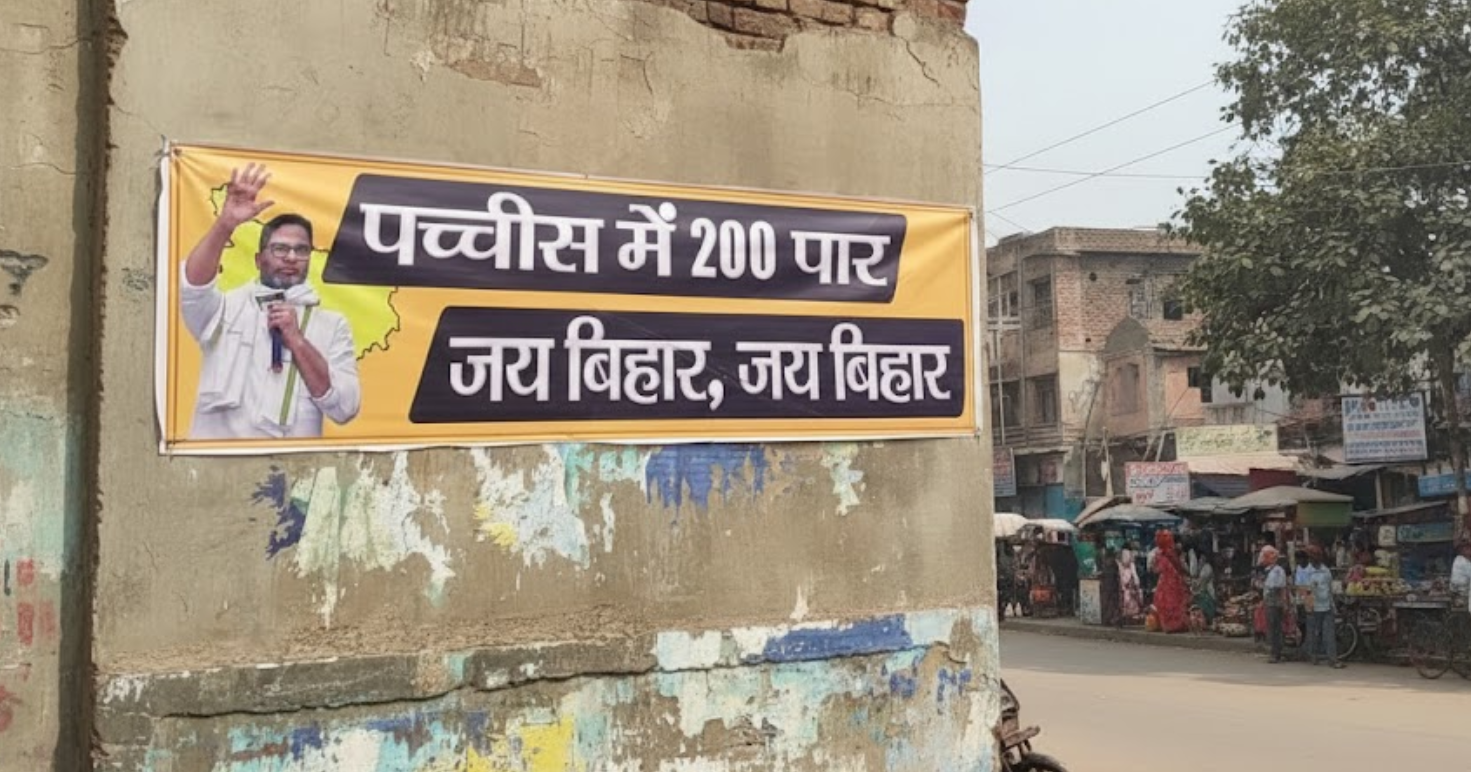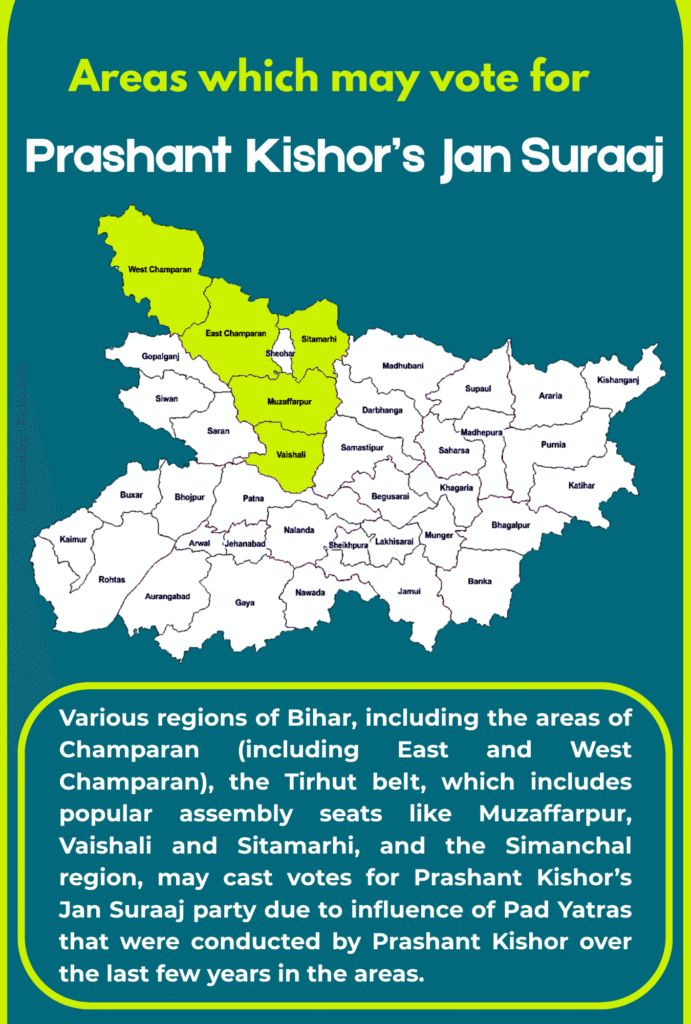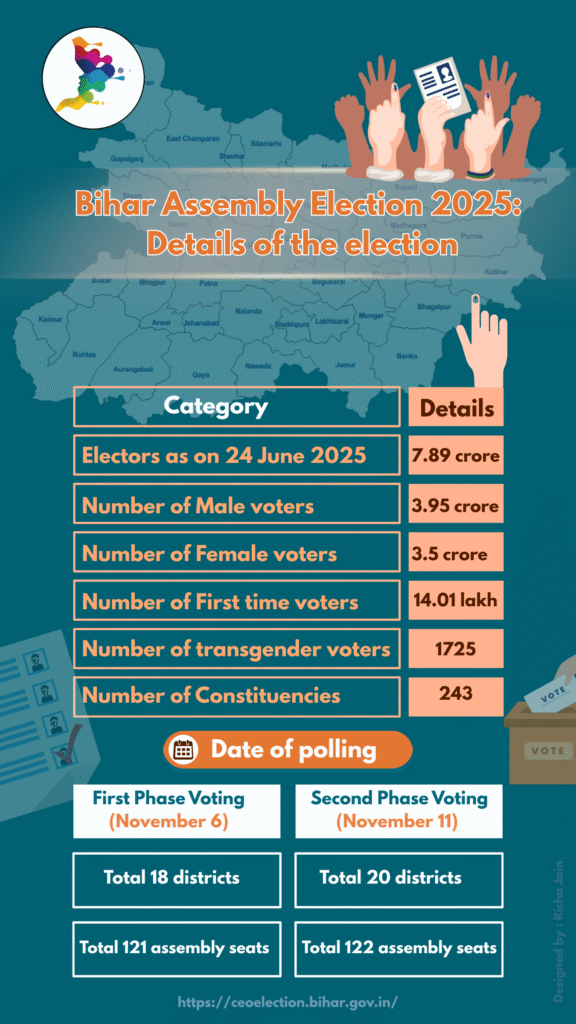As Bihar braces up to vote for its 18th Legislative Assembly, the political arena is abuzz with a new entrant into the dance of democracy – the Jan Suraaj Party. In its maiden attempt in a state with the third largest number of assembly constituencies (243), the Prashant Kishor-led party seems to have fielded a threat for the incumbent National Democratic Alliance (NDA), led by the Janata Dal (United) [JD(U)] and Rashtriya Janata Dal (RJD), which leads the Mahagathbandhan.
In a state where election campaigning has traditionally revolved around caste politics and personality-driven voting, Prashant Kishor’s slogan “Badlaav Aap Hi Layenge” (You will bring the change yourself) challenges the voters to think differently. While young voters in the state view it as a fresh strategy and a possible call for change, others doubt whether such a message can actually succeed in the state’s political culture, which continues to be shaped by caste and identity-based politics.
The Voices student reporter speaks with a cross-section of voters in various assembly constituencies of the state to assess the promises and potential impact of the Jan Suraaj Party.
Voters Divided On Jan Suraaj’s Message
The different election campaigning of the Jan Suraaj party has drawn mixed reactions from the diverse electorate of Bihar.


Voters, such as senior citizen Pradeep Kumar from the Gaya assembly seat, sitting inside a sweet shop near the Gandhi Maidan road, are sceptical that Jan Suraaj will actually break the glass ceiling. Saurav Kumar, a senior journalist at India.com (Zee Digital) and a voter from the Chand Choura area of the Gaya Town Assembly seat, has covered the party’s campaigns in detail and observes significant crowds at Jan Suraaj rallies, but adds that the crowd translating into a large number of votes cast is yet to be seen.
“While covering the campaigning for the upcoming Bihar assembly elections, I witnessed huge crowds at the rallies of Prashant Kishor’s party. However, when I spoke to the general public, many of them still didn’t know Jan Suraaj enough, which could possibly be the reason why the crowd may fail to convert into votes,” he said while talking to The Voices.

How Do Bihar Voters View the Repeal of Liquor Ban Promises?
Saurav highlighted particular concern about the party’s liquor policy. “Jansuraj has announced that if their government comes to power, they will repeal the liquor ban to boost state revenue. The decision has caused considerable anger, especially among the women voters of Bihar who are the worst victims of excessive alcohol consumption by men,” he said.
Sonali Kumari, a young female voter of Bihar from the Mithapur area of the Patna Sahib seat, echoes this concern, adding that the female voters of Bihar are one of the biggest voter banks of Bihar CM Nitish Kumar’s JD(U). However, with Prashant Kishor’s promise to repeal the liquor sale ban, support for the incumbent government may continue.
Will Jan Suraaj Usher In The Promised Jobs?

While some voters question Jan Suraaj’s policies, others have pinned their hopes on the party entering the realm of governance and creating jobs. Harsh Sinha, a first-time voter from Mandir Road, Bodhgaya Assembly seat, who is currently aspiring for a government job, expressed support for the Jan Suraaj party in the state. “The current government has failed to provide jobs to job-seekers of Bihar. They have to migrate to different cities. I feel Jan Suraaj may change this narrative and create enough job opportunities for youth,” Sinha told The Voices.
What Do Political Pundits Say?
Shiv Shankar Singh, professor in the political science department at A.N.S. College, Magadh University, while talking to The Voices, said the election agendas of Jan Suraaj are remarkably clear and transparent. He observed that many voters align with the party’s vision. Jan Suraaj’s approach is rooted in development, education and empowerment of the masses. “It can also be said that Jan Suraaj is not guided by ambition for power, but by a genuine desire to transform Bihar.

Azad Singh, an advocate of the Supreme Court of India and a voter from Pripanti, Kahalgaon Assembly, speaking to The Voices, said that although the party’s political campaign sounds good in theory, it is practically self-contradictory. “The message of transparent, data-driven governance and Bihar’s ‘Jungle Raj vs Sushasan’ politics addresses the real needs of the times. However, the party president, Prashant Kishor, has withdrawn his own candidacy and fielded candidates with questionable backgrounds, contradicting his own principles.
As of October 27, 2025, Prashant Kishor’s Jan Suraaj party has announced candidates for 117 of the 243 Assembly seats of Bihar for the coming elections. The party appears to be gaining momentum in the areas of West Champaran, East Champaran, Sitamarhi, Muzaffarpur, Vaishali, the Tirhut belt, and the Simanchal region.

Six candidates of the Jan Suraaj Party are considered “strong”
- R.K. Mishra — Candidate from Darbhanga: A Former IPS officer branded as “supercop” for his decades of policing/administration.
- K.C. Sinha — Candidate from Kumhrar: A renowned mathematician and former top-notch academician
- Dr. Amit Kumar Das — Candidate from Muzaffarpur: A local physician, he runs a hospital and is supposed to be a grassroots healthcare figure
- Jai Prakash Singh— Candidate from Chapra: Jai Prakash Singh is a former IPS officer.
- Yadu Vansh Giri — Candidate from Manjhi: He is a senior advocate who has served as Additional Solicitor General
- Ritesh Ranjan Pandey—Candidate from Kargahar: A renowned Bhojpuri singer with massive youth appeal.
While voters will deliver their verdict, the political arena remains on edge, waiting to see whether the new party will actually change the political narrative with a message of voter self-reliance. The real test of Jan Suraaj will be whether Bihar’s voters, accustomed to established patterns of patronage, are ready to embrace this new idea.
Copy Editor: Megha Mann

